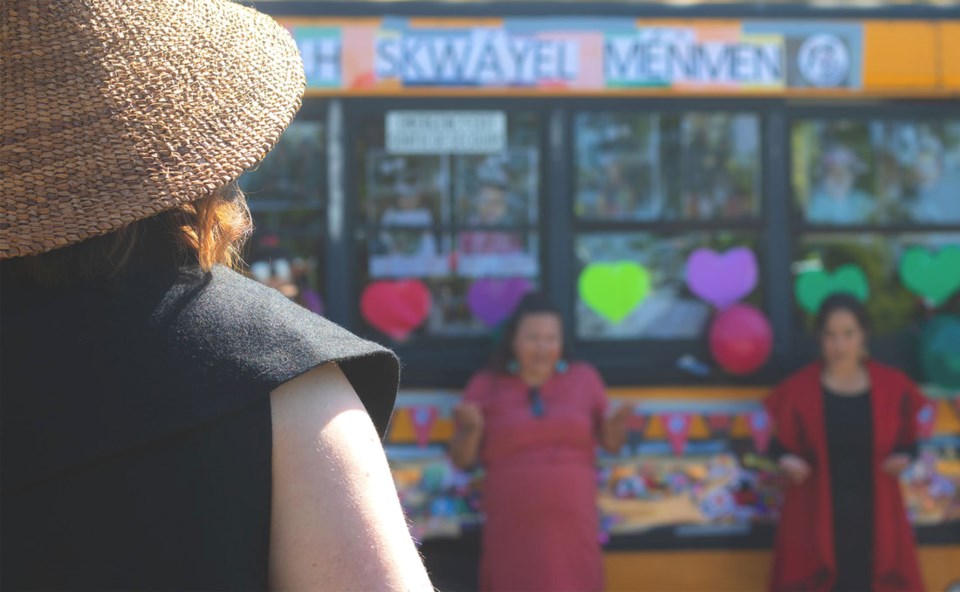The latest in ongoing efforts to revitalize and protect Sḵwx̱wú7mesh Sníchim (Squamish Language), the Ta na wa Ns7éyx̱nitm ta Snew̓íyelh (Language & Cultural Affairs) department at Sḵwx̱wú7mesh Úxwumixw (Squamish Nation) is looking for community nominees for its Language Commission.
The commission will be composed of up to five Nation members who will play a vital role in guiding language programming for the Nation. The commission will also be responsible for overseeing the use, the health, and the promotion of the language, while also taking steps to make Sḵwx̱wú7mesh Sníchim the official language of the Nation.
Squamish Nation spokesperson and Elder Syexwalyia (Ann Whonnock) said the language policy and commission will allow for the revitalization of the language to be “be spoken in the home, in our daily lives, not just infrequently.”
Tasked with ongoing education and certifying language teachers to teach the language more broadly in the future, Syexwaliya said the commission will help to implement what’s also outlined in the language policy, “and keep the legacy from our ancestors alive in a way that can be carried into the future.”
“The community is really happy with how everything's been being developed. The sense of Nation pride, community pride, parents and grandparents’ pride in their Mén̓men, their children, that come home, and help be the bridge for them to continue keep learning the language,” Syexwaliya said. “There’s that encouragement from the community, the Úxwumixw, the village level, to just continue doing good work and make the improvements that are needed.”
Learning and growing language knowledge is integral to Squamish ceremonies and cultural ways, Syexwaliya explained. Continuing to learn the language herself, as colonization and the residential school system tried to take the language away from her grandparents and parents, it was her uncle who told her it would be later in life that she would learn the language.
“I went into the longhouse, or traditional longhouse winter ceremonies, and that's when I really realized in my heart and mind that I had to learn how to say prayers in the language,” she said. “Because, when we do ceremony, we have to be able to use our own language. It’s been a long journey, and I'm still learning. And it has been a real good feeling in my heart every time I'm able to learn a bit more of how to put the sentence structure together.”
Syexwaliya said initiatives like Xwemelch'stn Etsímxwawtxw (Capilano Littlest Ones School) has given a real sense of pride to the Nation. The school, which runs from Kindergarten to Grade 4, teaches in Sḵwx̱wú7mesh Sníchim.
“My grandson, when he went there, he would be able to come home singing songs, and I just felt the pride that is being built into, embedded into, our children and for our future generations,” she said. “And it makes me feel good that I was part of a long time ago, being able to start the [language work] we did in the 90s. And see where it's evolved to now.”
In a statement released by the Nation, future commissioners should have some mix of an understanding of language policy, experience with Sḵwx̱wú7mesh Sníchim planning in family and community contexts, an academic background in language, high levels of connectivity with Sḵwx̱wú7mesh Sníchim and community initiatives, and/or high level of proficiency in the Sḵwx̱wú7mesh Sníchim.
Syexwaliya also added that Elders and people who may not be fluent or haven’t been through formal training programs are welcome to be nominated.
“We believe that there are members that are good stewards for the language, those who have different levels of understanding or speaking, and those who will have a quick grasp of the policy that's being put in place, as well as those who have grown up with grandparent who shared the language with them, the legends in the language.
“We’ve always been here, since time immemorial. We have become invisible in our land; we're now becoming more visible. And it's being able to continue that,” she said.
“That connection between the past, the present, and into the future is really important to us. And that's our languages. And it's being able to have the commission be people who have been connected to the language, even if it's through, maybe not being a fluent speaker, but knowing our history and where we've come from.”
Nominations can be made through the Squamish Nation website until Jan. 31.



